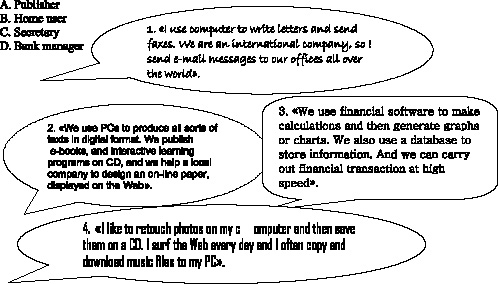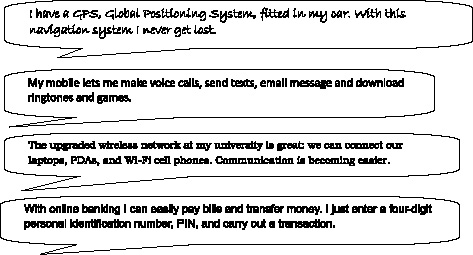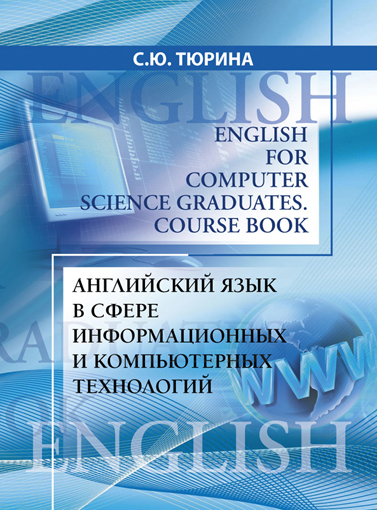
Научная электронная библиотека
Монографии, изданные в издательстве Российской Академии Естествознания
Unit 1. COMPUTERS IN HUMAN LIFE
WARM-UP
Discuss the following questions.
1. Can computer be considered as one of the most significant achievements of the XX century? Why?
2. What is computer?
3. What spheres of life are computers used in?
SPEAKING ACIVITIES
1. Read the text and compare your answers to the questions listed above with the information from the reading passage.
COMPUTERS IN HUMAN LIFE
Computer is perhaps the best invention and one of the most significant achievements of human thought.
A computer does not necessarily mean a monitor, keyboard, mouse and a CPU. A computer is any machine or device that can compute and execute instructions given to it in the form of programs. So technically, even a cell phone is a computer. And so are desktops, laptops, tablet PCs and PDAs. Anything that can perform a series of operations on its own is a computer. This gives us the idea how great the role of computers is.
One of the most important advantages of computers is in the field of science for research and development. The satellites, the telescopes and almost all the research tools make use of computers.
Next important use of computers is in the medical field. Many high tech surgical machines and instruments are endowed with small computer systems so that any surgical process is recorded and monitored to avoid complications. Many clinical imaging processes are conducted with the help of computers, such as X-ray and CT scan, etc.
Computers are a must in the field of education. The Internet is a huge source of information. We surf the internet and simply need to google to find any information. Different universities deliver online degrees, and distance learning is spreading dramatically. Notebooks are used to write research paper and Word Processing software automatically corrects spelling and grammar mistakes.
Software is widely used in communication sphere. People can send messages by e-mail to a person who is thousands of miles away. Chat software enables one to chat with another person on a real-time basis. Video conferencing tools are becoming available.
Next, all financial transactions are done by computer software. They provide security, speed and convenience.
The field of entertainment has been revolutionized by computers. Animation, graphic image manipulation, movie making, music composition, three-dimensional model creating have made the entertainment experience hundred times better. Computer gaming is achieving new landmarks in terms of technology.
This is only the tip of the iceberg. Software engineers, writers, businessmen, employees in the field of telecommunication, banking, research, medicine use computers daily.
Finally, just imagine one day without using your PC or any computer based application. You will surely understand the importance of this «thinking machine» in your life.
2. Some people say computers are the best way of teaching students. Conduct a survey on the benefits of computers in education and report your findings in class.
Suggested online resources:
http://www.buzzle.com/articles/role-of-computers-in-education.html
http://www.ryuuyume.net
http://communication.ucsd.edu/bjones/comp_lit_paper.html
http://suppes-corpus.stanford.edu/browse.html?c = comped&d = 2000
http://www.csulb.edu/~murdock/histofcs.html
http://www.illinoisloop.org/computers.html
3. In small groups discuss what you can do with computers in different areas. Use the following word-combinations to help you.
Formula 1 car: design the car, test virtual models, control electronic components, monitor engine speed, store information, display data, analyse and communicate data.
Industrial process: design product, do calculations, control industrial robots, control assembly lines, keep record of stock/ materials.
Entertainment: download music, burn CDs, play games, take photos, edit photos, make video clips, watch movies, listen to MP3s.
4. Read what people say about the use of computers in their life. Match the statements
1-4 with the profession A-D.

Now make the list of the ways you use computer in your free time and for work.
5. How can people of the following professions use computers? Compare your answers with others in your group.
• Architects
• Interior designers
• Farmers
• Landscape gardeners
• Musicians
• Sales people
6. Work in pairs. Find out the following information from your partner.
For example: download music from the Internet (what site)
– Have you ever downloaded music from the Internet? What site did you use?
– …
– send a video email attachment (who to, when);
– fit an expansion card (which type);
– replace a hard disk (what model);
– fix a printer fault (what kind);
– make your own website (how);
– have a virus (which virus);
– watched TV on the Internet (what channel );
– write a program (which language).
Now report the information you have just learnt from your partner to the class.
7. People who have grown up with PCs are often called the digital generation. Some digitally native people spoke about advantages of computers use. Look at these examples and speak on advantages of computers in our life.

8. Read the following sentences A-E. What problems 1-5 do they refer to?
|
1. Computer addiction 2. Cybercrimes 3. Technological dependence 4. Loss of privacy 5. Computer anxiety 6. Electronic waste |
A. We are sorry to announce that the Flight 345 to Rome is delayed. B. He should go to a psychologist. He spends hours surfing the Web. C. I’ve been trying to carry out me home assignment without the use of computer. D. Technology changes so quickly that we have to scrap computers when they become obsolete. E. I’ve been getting emails about offers for products I do not need. F. My computer system was broken and some useful information has been destroyed. |
9. Read the statements. Say which of them you agree or disagree with. Give some reasons to support your opinion. Use the phrases in the LANGUAGE BOX to help you.
|
LANGUAGE BOX |
|
|
GIVING OPINION. AGREEING AND DISAGREEING |
|
|
Giving your opinion |
I think/ feel that… In my opinion … In my view… |
|
Clarifying |
So, you’re saying… In other words … Do you mean… |
|
Asking for opinion |
What do you think … How do you see it? How do you like it? |
|
Agreeing |
Yes, that is quite right … That’s true … I quite agree … I see what you mean. |
|
Disagreeing |
Yes, but… Actually, I think that… To be honest... I don’t quite agree… |
1. Our society has developed technological dependence. When computers are down, our way of life breaks down: planes stop flying, telephones don’t work, and banks have to close.
2. Computers produce electronic waste, plastic cases and microchips that have to be recycled or just thrown away.
3. They are responsible for health problems, e.g. computer addiction, an inappropriate use of computers.
4. Cybercrime is creating serious problems.
5. Citizens may feel loss of privacy due to unauthorized use of personal data or receiving unwanted electronic messages.
6. The Web has become a dangerous territory for children and teenagers.
7. The Internet is a wonderful resource for lonely and elderly people.
8. There is no need to read books nowadays. Everything can be found online.
10. You are going to hold a debate on advantages and disadvantages of computer use in different spheres of life. Divide into two groups to prepare arguments pro and con. Use the phrases in the LANGUAGE BOX to help you. A group to provide the last argument in the debate wins.
|
LANGUAGE BOX |
|
|
GIVING OPINION. ADVANTAGES AND DISADVANTAGES |
|
|
Discussing advantages |
There are several advantages/disadvantages. Firstly, … Secondly, … Another advantage is that… One good/bad thing/point about … is that … One thing we should remember is … |
LISTENING ACTIVITIES
You are going to watch «When Computers Changed the World». It is just one of more than 100 videos in the Computer History Museum’s new exhibition: «Revolution: the First 2000 Years of Computing». In the span of a single lifetime, computers have gone from large, incredibly expensive and rare devices to small, low-cost, ubiquitous tools that we can’t imagine living without. Yet, few people know the history of how this came to be.
Suggested online resource:
http://www.youtube.com/watch?v = aLg4MHyyqL0
1. Watch the video and answer the following questions.
1. What do we use computers for?
2. What are the results of industrial and computer revolution?
3. What does Steven Levy, Technology journalist, say about computers?
4. What does Sunil Nagaraj say about the differences of computers in the 50-s, in 70-s
and in the 90-s?
5. What famous names are mentioned in the video?
2. Watch the video episode 00:48 and fill in the missing words.
Computing is ___________, computing is ___________. It is how we _______, get the ______ and __________ finance. It is how we ___________, chat, and ______ ______. Computing is _____ and ________ in our daily life.
3. Watch the video episode 2.28:2.50. The names of famous inventors of different times are mentioned. Prepare a small report about one of them.
4. Comment on the following statement: The story of computing is a human story. It’s about us. Who said these words?
5. Agree or disagree with the following statement: We are a privilege generation. Use the phrases of agreeing or disagreeing to help you.
